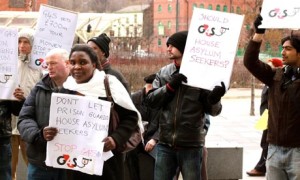The chequered history of housing asylum seekers

Ever since numbers of asylum seekers began to shoot upwards in the late 1990s, government support has had two conflicting objectives: complying with international obligations to care for the victims, while at the same time deterring as many asylum seekers as possible from coming here. More recently we could add a third: cutting the costs of that support.
Asylum seekers have always been victims in two senses: escaping whatever drove them away from their homes in first place, and coping with the vagaries of the support systems in the countries where they seek refuge. In Britain, there have been ten major pieces of legislation in twelve years (with another on its way), as well as many other changes affecting the support that asylum seekers get. Almost invariably, each change brings reduced entitlements.
For asylum seekers needing state-funded accommodation, the two biggest upheavals were in 2000 and 2013. In 2000, dispersal began, with a range of contractors spanning local councils, voluntary bodies and the private sector providing accommodation and support in regions away from London and the South East. The change was huge, not least because numbers shot up from 27,800 cases in 2001 to 80,000 in December 2003. The hardship suffered was considerable, as asylum seekers were located away from support networks and often in poor, largely ‘white’ estates.
But as the providers gained experience, things began to improve. Many gave better support to help people settle in, hired staff with relevant language and cultural skills, planned clusters of people speaking the same language to help promote mutual support, and tried to avoid successive moves so asylum seekers could retain access to schools and services. The contract payments were often invested in support services and in developing the capacity of local migrant groups. Initial problems of suspicion and hostility in the receiving communities began to recede.
In some ways the system was a victim of its own success: when the Home Office lost 25% of its funding under the coalition government in 2010, it was pretty obvious that the axe would fall on asylum support. The re-contracting process (known as COMPASS) began in 2009, but it was later turned into a ‘reverse auction’ which drove down prices and squeezed out the old providers. Six new contracts replaced 22 old ones, and there were only three contractors: G4S, Serco and Clearel, of which only Clearel had any prior experience of asylum work. The aim was to save £140m over seven years.
The imperative for the new contractors was to get accommodation quickly at the lowest possible cost. The problem facing them was that the council properties used before were usually cheaper, but the councils were often reluctant to enter new contracts except at higher rents. Normal private sector rents are much higher, so knock-down prices inevitably produced a low-grade service. The result was often to concentrate asylum seekers in the same low-cost areas that house other vulnerable people, and in the poorest properties.
This is where the story is picked up by the National Audit Office, which has just issued its report on the transition to the COMPASS contracts. It found that G4S and Serco often took on properties without inspecting them, and that many didn’t meet even the Home Office’s basic standards. About 650 households had to move and the process was often fraught with problems. The contractors are still in dispute with the Home Office about the process. Many of the issues are unresolved and, according to the NAO, still affect performance under the contracts. Inspections in 2013 showed that only a minority of properties fully comply with requirements. No service user feedback has been sought, despite the fact that the Home Office gets about 50 formal complaints per month – even though people are reluctant to complain as they think it may affect their asylum claims.
The NAO says it recognises there have been recent improvements, but it recommends better procedures for securing accommodation standards, staff training and user feedback. At the same time it doesn’t question the logic of the change brought about by the COMPASS contracts, and its report inevitably supports the Home Office drive to cut costs.
While both the NAO and the earlier Home Affairs Committee inquiry may help to keep up the pressure to raise standards of accommodation, they barely touch on the broader issues of integration and the role of migrant support and community groups. These never featured strongly in Home Office policy even when dispersal started, but are now badly neglected. The loss of the cross-subsidy from the earlier contracts has been followed by a range of other direct cuts in support for asylum seekers, made worse by the retrenchment of local authorities as they too have faced massive budget reductions. Integration at neighbourhood level needs continuing investment, especially at a time when residents of poor neighbourhoods are experiencing benefit cuts, low wages, poor job prospects and the loss of other services. Any social housing provider would say their job is not just about homes, it’s about communities. But that’s a message that’s been lost in the drive to cut the costs of supporting asylum seekers to the bare minimum.
Original post: Migration Pulse